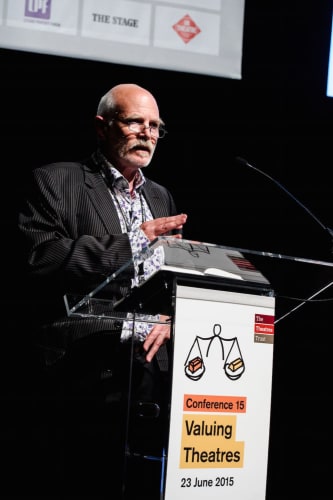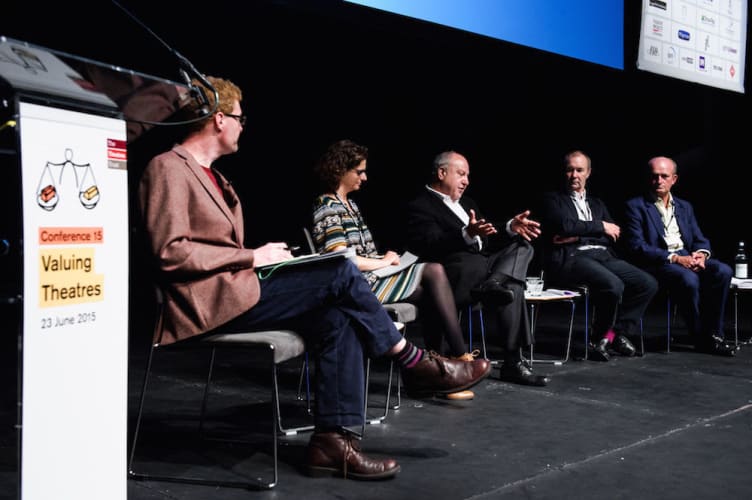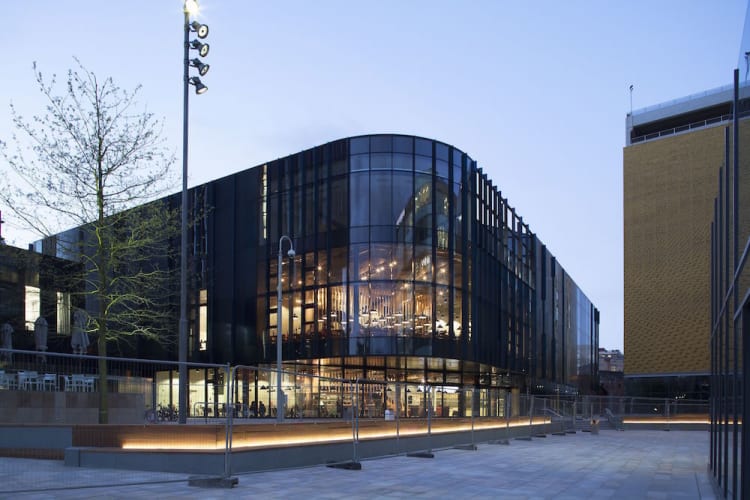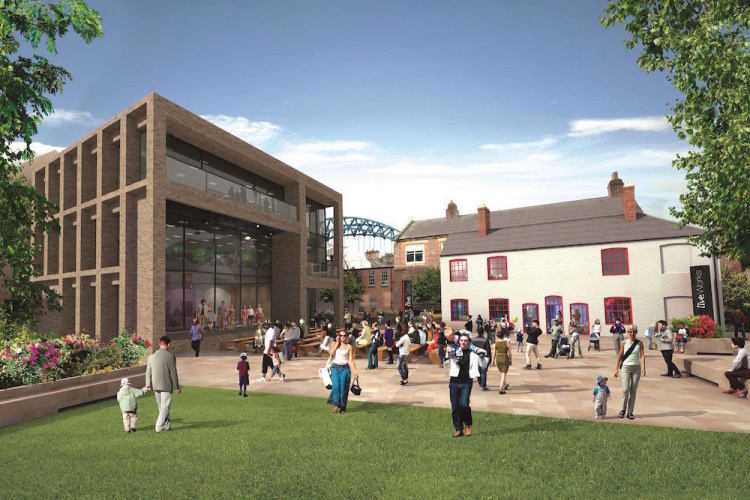Theatres and developers
Contributors to this session included both those who have worked hand-in-hand with developers and developers themselves. It was chaired by Richard Upton, Chief Executive of Cathedral Group.
It began with Tim Jones of Futurecity, which describes itself as a placemaking consultancy writing arts strategies for large brownfield developments and regeneration areas. He focused on the way that developers now think of creating cultural districts and multi-use spaces and Futurecity has brokered relationships between local authorities and developers. Most recently, it has been responsible for the creation of 90 new artist studios for Bow Art Trust and in the relocation of English National Ballet to new premises at City Island.
In his view, developers can reap huge rewards when they apply a culture-led approach at the start of the design process. Currently, they provide the only significant money forthcoming for new civic initiatives, but developers need partners who can nourish an artistic community, animate a place and add an identity to a development.
Theatres can do this but need to demonstrate to developers their ability to operate within commercial and mixed economy partnerships as well as produce great programming. They need to learn to present their skills in a way developers can understand and to embrace a willingness to expand their skills, for instance into managing retail outlets and street markets to provide new income streams.
Susie Gray from Wandsworth Borough Council, within whose area there are already theatres that include Tara Arts, 503 and BAC, spoke of a policy of partnership with developers leading to the delivery of cultural regeneration developments in Nine Elms and at Battersea Power Station along with a set number of dwellings and space to enhance arts and cultural opportunities with rent for cultural organisations reduced to 50% for the first 5 years to enable them to become established.
Land Securities is a property company that doesn’t own any theatres but as Ben Ridgwell, their West End Portfolio director explained theatres have an important place in the areas they have been developing, especially in Victoria. He looked back to the post-war period when they built offices but now they see their activities as needing to support local communities and being long-term and sustainable. They have replaced offices, storage and car parking with 22 acres that include offices, residential, restaurants, food and leisure.
Under Section 106 of the Planning Act, which permits a development proposal that would not otherwise be acceptable if it makes positive contributions to offset any negative impact, Land Securities provided land to allow a bigger footprint for the Victoria Palace and in the future will provide a new and enlarged stage house negotiated because the theatre had a clear idea of what it needed to be sustainable in the future.
Land Securities was not directly involved in the building of the St James’s Theatre but is adjacent to their Cardinal Place development but by a similar agreement negotiated start-up funding for the first five years of the theatre’s operation.
Land Securities also supports West End Live, which was previewed in a performance at Cardinal Place, and features the theatres in its newspapers and newsletters and offers tickets in competitions. Development has been planned to ensure matinées are not disturbed by construction and theatre trips arranged for workers have helped them understand the need to avoid disturbance. In fact only one performance has been lost because of construction work—and that was for the Underground not Land Securities.
Barry Pritchard is Executive Director and Head of the Arts Team at Aedas, a group dedicated to the design of performing arts buildings which was responsible for the design of the new facilities for Guildhall School as part of the Milton Court complex (including the theatre in which the conference was held).
The development is a collaboration between the City and developers Heron International, Aedas contributing an expertise that was not part of Heron’s experience. It was all made possible by the creation of a 36-storey tower of 285 luxury apartments—there are still some available if you have £10 million or £16 million, whilst Guildhall School pays only a peppercorn rent.
A very different development was new building for Peckham’s 34-year-old Community Theatre. Its Artistic Director Teresa Early explained how her original discovery of buildings at the back of the Town Hall for which the Council no longer had use and the existence of Section 106 have led to a scheme funded by Alumno Developments and Southwark Council which will provide them with a new theatre, designed by Charcoalblue. Though this is on a different scale, she emphasised the need to bringing a theatre consultant—architects rarely have a full understanding of what theatres need.
Harvey Goldsmith’s new theatre at Wembley is on a different scale. He described how he had been enthralled by a production by Dutch company Imagination and wanted to stage it. its shows have been enormously successful—one ran in an aircraft hangar for five years, then they built their own theatre.
He is building one here where he will stage Hunger Games. He emphasised that it is no use just having an idea; you have to be able to put it over and stick with it. People, including developers, like the idea of being associated with artistic enterprise but for developers it is all part of a game with local authorities.
Everyone has to be an entrepreneur, including those in the non-profit sector. A lot of young people seem to lack confidence. Art and culture are vital, the soul of our lives, but it needs people to come out of the dependency mire and come up with ideas. If you really believe in what you are doing stick at it. You can always bring on board someone to do the bit you’re not skilled at: develop early stage partnerships, get involved with the local authority and make contact with the business community.




